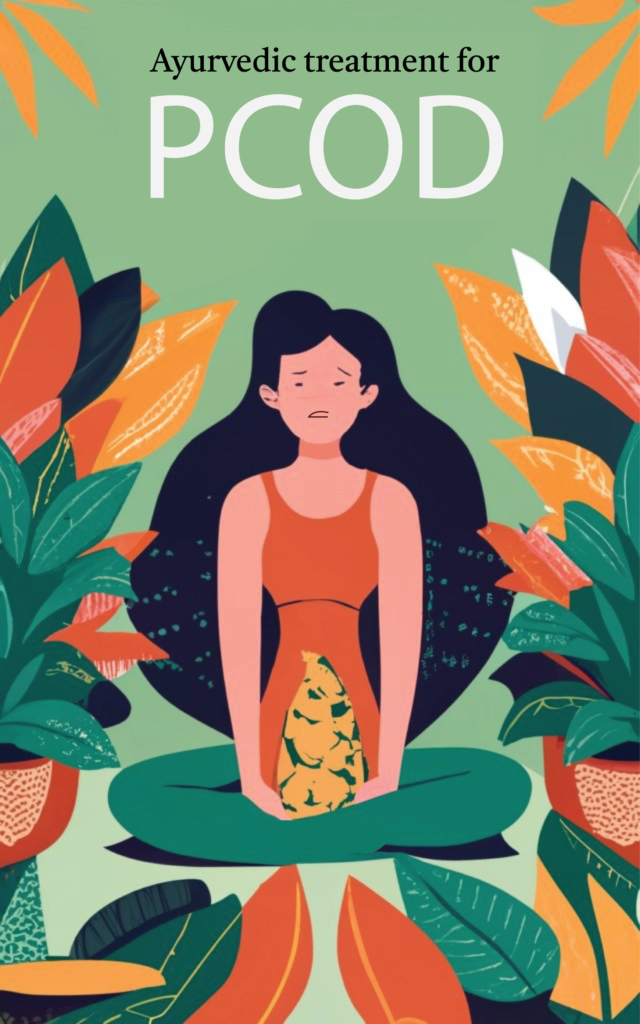Introduction
Polycystic Ovarian Disease (PCOD), also known as Polycystic Ovary Syndrome (PCOS), is a medical condition that affects women during their reproductive age. It is characterized by large numbers of immature or partially mature eggs, which develop into cysts in the ovaries. This leads to enlarged ovaries and the secretion of excessive male hormones, causing infertility problems, irregular periods, weight gain, and other health issues.
PCOD affects approximately 9%-36% of women in India. In modern medicine, hormonal pills and drugs are commonly used to treat this condition. Medications like Metformin are prescribed to increase insulin sensitivity, as insulin resistance plays a crucial role in developing PCOD.
Ayurvedic understanding
According to Ayurveda, the root cause of PCOD (Polycystic Ovarian Disease) can be traced back to childhood habits such as wearing diapers and tight clothing and adult behaviors like withholding natural urges like urination. Other factors include consuming incompatible foods and not drinking enough water.
This blocks the downward movement of Vata energy, known as Udavarta in Ayurveda.
These blocks represent bad Kapha energy.
This disrupts the hormonal balance. The uterus is a seat of Vata, and the blocks affect the Vata energy in the uterus.
This disruption leads to an increase in the male hormone testosterone, causing the development of male tendencies both internally and externally. In Ayurveda, the fire element (Agni) represents female energy, while the water element (Soumya) represents male energy. Therefore, the goal is to increase the fire element in the patient, which can be achieved through balancing hormones like estrogen.
Ayurvedic Treatment of PCOD at Himveda
The main aim of treatment is to remove the blocked energy and hence improve the functioning of Vata.
Panchakarma treatments are commonly used to address PCOD (Polycystic Ovary Syndrome) by removing blocked energy and improving the functioning of Vata.
The first step in these therapies involves dry massages like Udvartanam or Pottali powder massage, which help cleanse the lymphatic system and remove fatty Kapha toxins from the body. Once the channels have been cleansed, the patient is given medicated ghee for four to five days to bind fat-soluble toxins, followed by a Vamana (vomiting cleanse) to eliminate the toxins.
Vamana cleanse removes Kapha from Kapha’s headquarters, which loosens Kapha blockages’ grip in other body parts, mainly the uterus.
Virechana (diarrhea cleanse) may also be done, but it is not the preferred treatment for PCOD as it primarily removes excess Pitta, which is not the main issue in PCOD.
After the Vamana procedure Basti (enema ) cleanse is done on the patient. If the patient is not fit for the Vamana procedure or is uncomfortable doing it, then Basti (enema) cleanse is done on him directly without making him undergo Vamana.
Basti cleanses act directly on the area where the blockages sit in PCOD. While the Kapha has already been weakened by the Vamana cleanse, the action of Basti cleans it up further. Cleansing enemas are administered for 7-10 days.
The therapies conclude with a Nasya protocol, where oil drops are administered in the nose to balance hormonal secretions. The entire treatment process typically takes around 3-4 weeks, and oral medications are taken for a few months to enhance the results of the therapies.
The patients who are not fit for Panchakarma therapies are treated with oral medications alone.
PCOD Diet
In the Ayurvedic diet for PCOD, avoiding or reducing foods rich in sweet and salty taste is essential. These tastes are known to increase Kapha, which can create blocks in the body. Therefore, avoiding sweets, starchy grains, refined grains, starchy vegetables, dairy, and excessive salt is recommended. Instead, focus on incorporating millets into your diet, as they have a low glycemic index and provide energy. Buttermilk is also beneficial in this diet.
Shatapushpa, or fennel, is a kitchen herb that can help treat PCOD. It aids in regular ovulation and improves fertility. Taking Triphala powder at bedtime can also have positive effects.
Other good foods to include are leafy vegetables and green tea.
In addition to following the Ayurvedic diet, regular exercise is essential in treating PCOD. Activity that induces sweat can help reduce weight, improve insulin sensitivity, and remove blocks in the body.




4 Responses
PCOD problem
PCOD requires Panchakarma therapies. Please share your ultrasound and bood reports on 9736853285 so that we can guide you further.
Pcod
Dear Mr. Hardik
We treat PCOD. Best results are achieved when the patient stays with us. During this certain therapies and cleanses are performed. Strict diet and lifestyle is followed.
For more details please whatsapp 9736853285